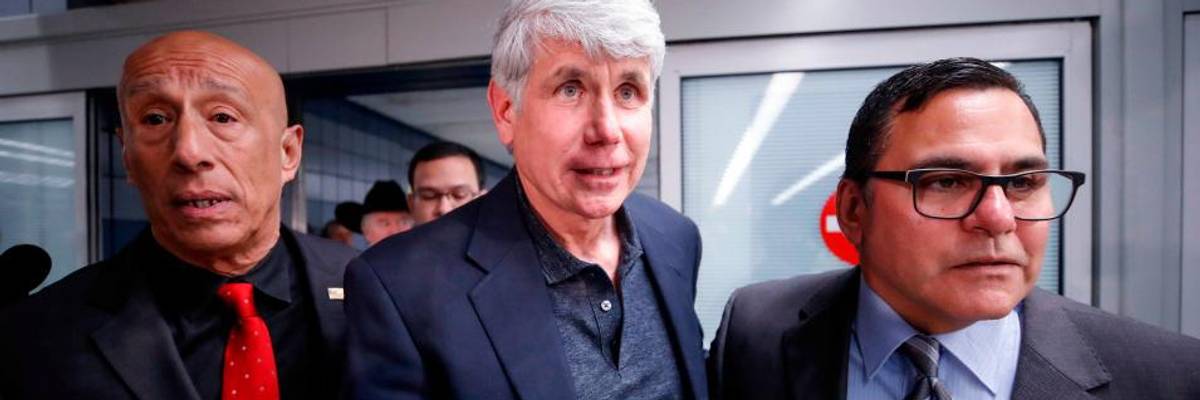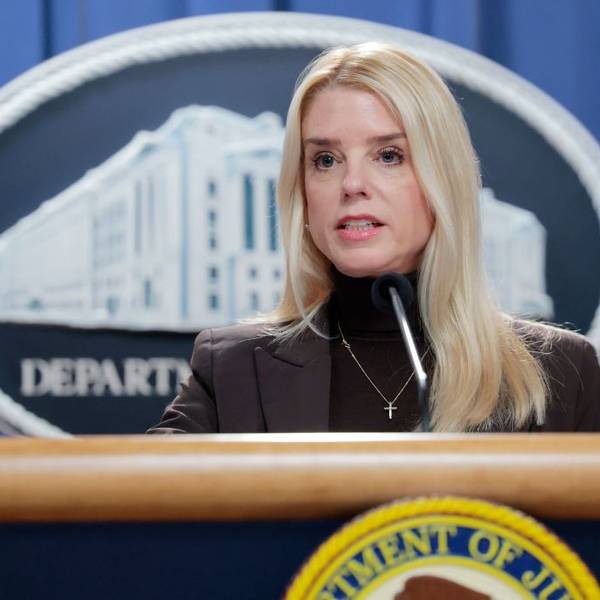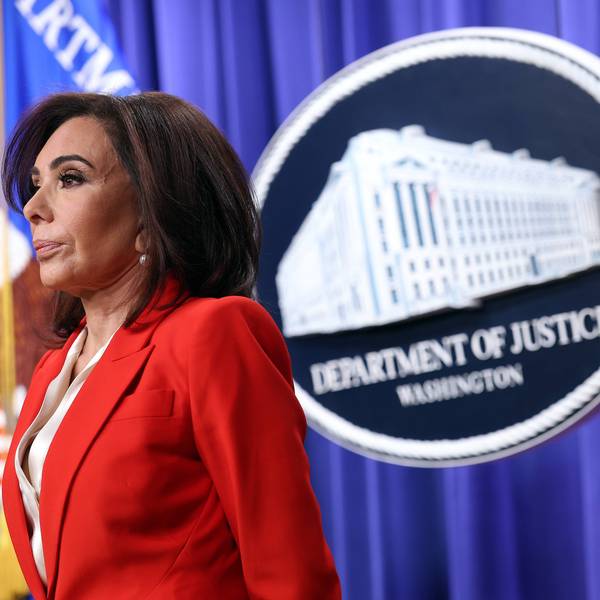
Former Illinois Gov. Rod Blagojevich arrives at O'Hare International Airport after being released from prison on February 19, 2020 in Chicago. (Photo: Kamil Krzaczynski/AFP via Getty Images)
'Disturbing': Study Shows DOJ Prosecutions of White-Collar Criminals Hit All-Time Low Under Trump
"Never has white-collar crime gone so ignored."
Prosecutions of white-collar criminals by the U.S. Justice Department plunged to an all-time low in January, according to a study published just days after President Donald Trump proclaimed his commitment to "safeguarding the American consumer" and "strengthening our efforts to prevent and prosecute fraud."
"White-collar and corporate prosecutions are at their lowest point in modern U.S. history. Never has white-collar crime gone so ignored."
--Transactional Records Access Clearinghouse, Syracuse University
The analysis released Tuesday by Syracuse University's Transactional Records Access Clearinghouse (TRAC) found that the Justice Department prosecuted just 359 white-collar criminals in January, a decline of 25% from five years ago. TRAC has been recording data on white-collar prosecutions since 1986.
"Federal white-collar prosecutions have fallen from their peak of over 1,000 in June 2010 and February 2011," the study found. "During the Obama administration in [fiscal year] 2011, they reached over 10,000. If prosecutions continue at the same pace for the remainder of FY 2020, they are projected to fall to 5,175--almost half the level of their Obama-era peak."
David Sklansky, a former assistant district attorney and co-director of the Stanford Criminal Justice Center, called the decline "disturbing."
"It's a matter of concern that federal prosecutions of white-collar fraud have declined so precipitously," Sklansky told MarketWatch. "When the U.S. Attorney's offices file fewer of these cases, that slack is unlikely to be picked up by district attorneys or state prosecutors."
The study came in the middle of National Consumer Protection Week, which began March 1 and ends on Saturday, March 7. President Donald Trump marked the occasion with a statement vowing to prosecute "bad actors seeking to harm and exploit honest and hardworking people through deception and other nefarious tactics."
"It's a strange claim, given that federal white-collar crime prosecutions are at an all-time low," Washington Post columnist Catherine Rampell tweeted in response to Trump's statement.
Last month, as Common Dreams reported, Trump granted clemency to several high-profile white-collar criminals, including "junk bond king" Michael Milken and former Illinois Gov. Rod Blagojevich.
"White-collar crimes, in Trump's worldview, are not 'real crimes,'" MarketWatch columnist Paul Brandus wrote at the time.
An Urgent Message From Our Co-Founder
Dear Common Dreams reader, The U.S. is on a fast track to authoritarianism like nothing I've ever seen. Meanwhile, corporate news outlets are utterly capitulating to Trump, twisting their coverage to avoid drawing his ire while lining up to stuff cash in his pockets. That's why I believe that Common Dreams is doing the best and most consequential reporting that we've ever done. Our small but mighty team is a progressive reporting powerhouse, covering the news every day that the corporate media never will. Our mission has always been simple: To inform. To inspire. And to ignite change for the common good. Now here's the key piece that I want all our readers to understand: None of this would be possible without your financial support. That's not just some fundraising cliche. It's the absolute and literal truth. We don't accept corporate advertising and never will. We don't have a paywall because we don't think people should be blocked from critical news based on their ability to pay. Everything we do is funded by the donations of readers like you. Will you donate now to help power the nonprofit, independent reporting of Common Dreams? Thank you for being a vital member of our community. Together, we can keep independent journalism alive when it’s needed most. - Craig Brown, Co-founder |
Prosecutions of white-collar criminals by the U.S. Justice Department plunged to an all-time low in January, according to a study published just days after President Donald Trump proclaimed his commitment to "safeguarding the American consumer" and "strengthening our efforts to prevent and prosecute fraud."
"White-collar and corporate prosecutions are at their lowest point in modern U.S. history. Never has white-collar crime gone so ignored."
--Transactional Records Access Clearinghouse, Syracuse University
The analysis released Tuesday by Syracuse University's Transactional Records Access Clearinghouse (TRAC) found that the Justice Department prosecuted just 359 white-collar criminals in January, a decline of 25% from five years ago. TRAC has been recording data on white-collar prosecutions since 1986.
"Federal white-collar prosecutions have fallen from their peak of over 1,000 in June 2010 and February 2011," the study found. "During the Obama administration in [fiscal year] 2011, they reached over 10,000. If prosecutions continue at the same pace for the remainder of FY 2020, they are projected to fall to 5,175--almost half the level of their Obama-era peak."
David Sklansky, a former assistant district attorney and co-director of the Stanford Criminal Justice Center, called the decline "disturbing."
"It's a matter of concern that federal prosecutions of white-collar fraud have declined so precipitously," Sklansky told MarketWatch. "When the U.S. Attorney's offices file fewer of these cases, that slack is unlikely to be picked up by district attorneys or state prosecutors."
The study came in the middle of National Consumer Protection Week, which began March 1 and ends on Saturday, March 7. President Donald Trump marked the occasion with a statement vowing to prosecute "bad actors seeking to harm and exploit honest and hardworking people through deception and other nefarious tactics."
"It's a strange claim, given that federal white-collar crime prosecutions are at an all-time low," Washington Post columnist Catherine Rampell tweeted in response to Trump's statement.
Last month, as Common Dreams reported, Trump granted clemency to several high-profile white-collar criminals, including "junk bond king" Michael Milken and former Illinois Gov. Rod Blagojevich.
"White-collar crimes, in Trump's worldview, are not 'real crimes,'" MarketWatch columnist Paul Brandus wrote at the time.
Prosecutions of white-collar criminals by the U.S. Justice Department plunged to an all-time low in January, according to a study published just days after President Donald Trump proclaimed his commitment to "safeguarding the American consumer" and "strengthening our efforts to prevent and prosecute fraud."
"White-collar and corporate prosecutions are at their lowest point in modern U.S. history. Never has white-collar crime gone so ignored."
--Transactional Records Access Clearinghouse, Syracuse University
The analysis released Tuesday by Syracuse University's Transactional Records Access Clearinghouse (TRAC) found that the Justice Department prosecuted just 359 white-collar criminals in January, a decline of 25% from five years ago. TRAC has been recording data on white-collar prosecutions since 1986.
"Federal white-collar prosecutions have fallen from their peak of over 1,000 in June 2010 and February 2011," the study found. "During the Obama administration in [fiscal year] 2011, they reached over 10,000. If prosecutions continue at the same pace for the remainder of FY 2020, they are projected to fall to 5,175--almost half the level of their Obama-era peak."
David Sklansky, a former assistant district attorney and co-director of the Stanford Criminal Justice Center, called the decline "disturbing."
"It's a matter of concern that federal prosecutions of white-collar fraud have declined so precipitously," Sklansky told MarketWatch. "When the U.S. Attorney's offices file fewer of these cases, that slack is unlikely to be picked up by district attorneys or state prosecutors."
The study came in the middle of National Consumer Protection Week, which began March 1 and ends on Saturday, March 7. President Donald Trump marked the occasion with a statement vowing to prosecute "bad actors seeking to harm and exploit honest and hardworking people through deception and other nefarious tactics."
"It's a strange claim, given that federal white-collar crime prosecutions are at an all-time low," Washington Post columnist Catherine Rampell tweeted in response to Trump's statement.
Last month, as Common Dreams reported, Trump granted clemency to several high-profile white-collar criminals, including "junk bond king" Michael Milken and former Illinois Gov. Rod Blagojevich.
"White-collar crimes, in Trump's worldview, are not 'real crimes,'" MarketWatch columnist Paul Brandus wrote at the time.

